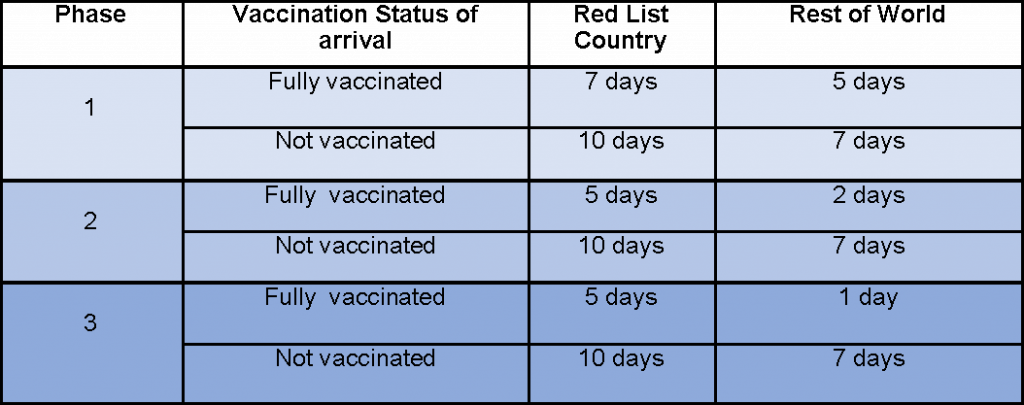29 July 2021
The Incident Executive Group (IEG) met on 22 July and agreed a phased risk-based approach to modify entry and quarantine arrangements.
IEG will determine when Phase 1 and subsequent phases, will start. No date has been confirmed however work is taking place with the aim for the first phase to start in October.
The decision to move to Phase 1 will be based on a set of local and international trigger points. These will include double vaccination rates in the UK exceeding 60% of the adult population, the new Oxygen Plant operational on-Island, no community transmission on St Helena, the capability of the Health Service to operate normally, the evolving international situation, and the latest medical advice. St Helena Government (SHG) will be agile and closely monitor changes around the world and respond on-Island accordingly.
The decision to move to Phase 2 and 3 will be based on the triggers above plus a regard of the progress in the vaccination rates of the UK adult population. No date has been confirmed however work is taking place with the aim for the second phase to start in November and the third phase to start in December. All decisions will be subject to political approval.
The phased changes to quarantine times only applies to those who have been double vaccinated at least two weeks prior to arrival. Any passengers who are not double vaccinated and have been in a red list country in the 10 days prior to travel will be subject to the existing 10 days of quarantine.
For each phase the arriving passengers, country of origin and whether they have been fully vaccinated or not, will determine the length of the quarantine period they will be required to undertake on their arrival to St Helena.

The change in quarantine periods reflect data on vaccination effectiveness, testing effectiveness and risk, as well as a recognition that 97% of St Helena’s adult population is now fully vaccinated which now offers a high level of protection from infection. The process for a red list will be developed; a red list allows St Helena to react quickly to information about variants and emerging high rates of infections for example.
For each phase the following testing protocols will remain in place for all inbound passengers:
- Negative PCR COVID-19 test no more than 72 hours prior to departure
- Testing within 24 hours of arrival
- Release at end of designated quarantine period as above subject to a negative COVID-19 test.
Why reduce the Quarantine periods?
The Island’s quarantine arrangements are no longer consistent with the latest Public Health England advice, taking into consideration the following factors:
- The measures in place continue to be a practical response in supressing COVID-19 community spread on-Island i.e. Airport arrival protocols, good experience in operating home quarantine, well-practiced testing regimes, regular and extensive contact between SHG and following Public Health England specialists
- The risk of a traveller entering St Helena with COVID-19, after a negative test in advance, is highly unlikely
- There remains a proven capability in the Health Care system to manage a case if there was an isolated positive test result in a quarantine location
- Healthcare colleagues consider these measures are proportionate given the very low levels of risk of serious illness now posed to the population.
Reducing quarantine periods will give the following benefits to St Helena:
- It will make it more feasible for family and friends to visit St Helena and vice versa
- More family and friends visiting the Island this year and additional flights during the festive period could provide a positive boost for the Island population. Some St Helena operators and employers will be able to stay in business
- The consequences of a further lost summer season are of significant concern, leading to increased debts, closures and job losses. Travellers need certainty about future entry requirements and quarantine arrangements. There is also international momentum to re-open borders with more realistic entry arrangements that reflect the benefits of travellers and residents being fully vaccinated.
COVID-19 will continue to exist within communities
Worldwide it is being recognised that COVID-19 will continue to exist around the world in some form for many years. Public Health England advises that when a host community reaches 80% of vaccination coverage of the eligible population, coupled with full immunisation of travellers and quarantine as appropriate, then widespread (herd) immunity takes effect. This scenario provides an increased assurance level that quarantine periods can be reduced or even lifted. This beneficial situation is now being seen in many countries across the world, therefore actions are being taken to implement in order for communities to resume a form of normality.
SHG
29 July 2021